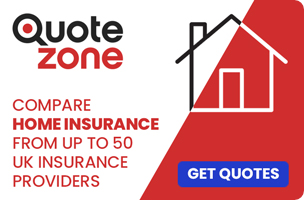Home insurance: What type do I need?
We cover the basics of home insurance: what home insurance you need to have, different types of home insurance, how insurance protects you, how much insurance costs and how to work out how much insurance cover you need.
Buildings insurance vs Contents insurance
There are two types of insurance for your home:
- Buildings insurance – this will pay for the repair or rebuilding of your house, in case there is major damage, such as a fire or falling tree
- Contents insurance – this covers damage or loss of contents, such as furniture or jewellery, in the case of fire, theft or even accidents
Do I need to have home insurance?
Building insurance is not legally mandatory. However, most mortgage lenders insist you have buildings insurance so that if your home is damaged they are not left without collateral for the loan
Contents insurance is neither legally mandatory, nor required by mortgage companies
Who is responsible for getting insurance?
If your property is freehold, the homeowner is responsible for all insurance.
If you are in a leasehold property, then the freeholder is invariably responsible for the buildings insurance, and the leaseholders are responsible for the contents insurance.
Flat owners should read our dedicated guide to insuring a flat.
If you are buying a new build property, see our dedicated guide on new build insurance.
For more information, see Leasehold v Freehold – what’s the difference?
Why should I have insurance?
For almost everyone, their home is by far the most valuable thing they own, and it has taken their working lives to save up for. If your house caught fire and you aren’t insured, you could watch everything you own go up in smoke, literally.
Without buildings insurance you will probably not be able to afford to rebuild the house, and despite not having anywhere to live, you would still have to repay your mortgage.
There is a less clear cut case for contents insurance but most people couldn’t afford to replace the contents of their homes if they were lost in a fire, stolen or damaged in a flood.
Valuable contents (in particular, jewellery, technology, paintings or furniture) make it particularly worth having contents insurance. It will certainly give you peace of mind.
What does insurance cover?
All insurance policies are different, and so you need to look at the small print to see what is covered. But in general:
- Building insurance covers the actual structure of the property including the floors, painted walls, and fixtures and fittings
- Fixtures and fittings are things like radiators, baths and shower heads that, if you turned the house upside-down and shook, would not fall out
- A standard building insurance policy will cover you for fire, wind, hail, explosion, vehicles or aircraft crashing into your home, smoke, and damage caused by criminal activity including vandalism and rioting – particularly useful in London since August 2011. It will often also cover damage from burst pipes
- Buildings insurance will also normally cover you for subsidence, provided that your property has not experienced subsidence before
- The building insurance policy will pay for the repair or rebuilding of your home (be aware that the cost of rebuilding your home in accordance with the current building regulations is different to the valuation of your home)
- Contents insurance covers all the stuff inside your home: laptops, electrical goods, white goods, furniture, jewellery, pictures, and so on. Sometimes the policies also cover bicycles and phones but you need to check
- Contents insurance normally covers fire damage and burglary. It can also cover accidental damage, and even theft of things such as jewellery when you are away from home.
- Contents insurance can either pay for replacement on a “new for old” basis (eg it will pay for a new TV, even though an old TV was stolen), or just at the market value of your things (which is generally a lot lower)
What are some common exclusions?
Flood insurance – if you are buying a house in a flood zone, or the house has flooded before, it can be more difficult to find an insurer that will cover you for risk of flood.
Subsidence, if your property has experienced subsidence before.
“Acts of God” – insurance-speak for major natural phenomena such as tidal waves, hurricanes, cliff-falls and other landslides, earthquakes and volcanic eruptions. Many insurance policies exclude or limit their liability for such events.
Acts of war and sonic booms from aircraft: so if France invaded using Concorde and your house was damaged this would not be covered.
Frost damage is also a common exclusion.
What properties are difficult to insure?
Some properties can be difficult to get insurance for, as they are not normally covered by mainstream insurers. You may end up having to go to a specialist insurer, which could cost you more. However, no property is uninsurable – it might just cost you more. Properties that can be difficult to insure include:
- Listed properties
- Thatched properties
- Former council houses
- Flats in big blocks
- Unusual properties, such as lighthouses or converted barns
When do I need to get insurance?
You are usually responsible for the property as soon as the contracts are exchanged, though these are legally murky waters and the situation will vary from contract to contract.
Most mortgage lenders will insist you already have buildings insurance in place by exchange of contracts.
How much should home insurance cost?
Premiums depend on a number of factors including but not limited to:
- the value of the property
- type of property
- your credit rating
- whether you have previously made any claims
- your security situation (e.g. your types of lock or whether you have an alarm)
- the number of people living in the property
- location of property
How do I value my house?
- You can have a surveyor give you a “rebuilding cost estimate”
- You can use the Association of British Insurers rebuilding cost calculator , for which you have to register for free
How do I value my contents?
The best way to do value the contents of your property for insurance is to:
- Go through your house room by room and estimate how much it would cost to replace every single bit of furniture and electrical good, including white goods and gadgets
- Do the same for books, CDs, DVDs, clothes, shoes, and sporting equipment
- If you have particularly valuable paintings, silver, jewellery or antiques consider having them professionally valued
- Add it all up together
How can I ensure I am eligible to claim?
If you have said you will use a burglar alarm, make sure you always put it on when you leave.
Keep doors and windows locked securely.
Do not leave the property empty for more than 45 days.
Ensure you report any criminal activity to the police immediately.
If you use your home as a business or as a place of business you should inform your insurers.
Is it worth shopping around for home insurance?
It is definitely worth shopping around for your home insurance cover, and for two reasons:
- there is an astonishingly large range in the premiums, and you could be paying several times more than you need to
- many insurers quote low for new customers, and then push up their premiums every year, relying on customer inertia to boost their profits. You can avoid this by regularly getting quotes every year or two
You should speak to at least three insurers – and more if you can bear it. Do use price comparison websites, but don’t rely on them – you need to talk direct to insurers.
How do I choose a home insurance policy?
There are a vast number of home insurance policies to choose from:
- You should decide whether you want to pay a high premium or a high excess – generally as one increases, the other decreases. Generally, you should go for as high an excess as you would feel comfortable paying, to keep the annual insurance fees lower
- When comparing policies, ensure you are comparing like for like – keep a record of all the questions you ask the insurers, and try to build up a comparison table
- Don’t feel you have to use the insurance company recommended by your mortgage company. They are almost certainly getting kickbacks and you will often be able of find something cheaper elsewhere
- Compare home insurance quotes from different providers or speak to an insurance broker
- Before you sign on the dotted line check they are authorised by the FSA to operate legally
- The Association of British Insurers has a lot of useful information
- Most importantly, read the small print
What other insurance do I need? Do I need life insurance?
If you are buying a house and taking out a mortgage, you may also be considering whether you need life insurance. You don’t need life insurance when buying a house and taking out a mortgage but it can be a very good idea to do so if you have dependents that rely on your income. See our guide to life insurance. It’s advisable to shop around for life insurance. Our partners at LifeSearch compare quotes from a range of major UK life insurers and offer fee free advice and no obligation quotes.
This information is intended for editorial purposes only and not intended as a recommendation or financial advice.
Top Owning Guides
Show More Articles+
Show Fewer Articles−
How this site works
HomeOwners Alliance Ltd is registered in England, company number 07861605. Information provided on HomeOwners
Alliance is not intended as a recommendation or financial advice.
Mortgage service provided by London & Country Mortgages (L&C), Unit 26 (2.06), Newark Works, 2 Foundry Lane, Bath
BA2 3GZ, authorised and regulated by the Financial Conduct Authority (FRN: 143002). The FCA does not regulate
most Buy to Let mortgages. Your home or property may be repossessed if you do not keep up repayments on your
mortgage.
HomeOwners Alliance Ltd is an Introducer Appointed Representative (IAR) of LifeSearch Limited, an Appointed
Representative of LifeSearch Partners Ltd, authorised and regulated by the Financial Conduct Authority. (FRN:
656479).
Independent Financial Adviser service is provided by Unbiased, who match you to a fully regulated, independent
financial adviser, with no charge to you for the referral.
Bridging Loan and specialist lending service provided by Chartwell Funding Limited, registered office 5 Badminton Court, Station Road, Yate, Bristol, BS37 5HZ, authorised and regulated by the Financial Conduct Authority (FRN: 458223). Your property may be repossessed if you do not keep up repayments on a mortgage or any debt secured on it.





